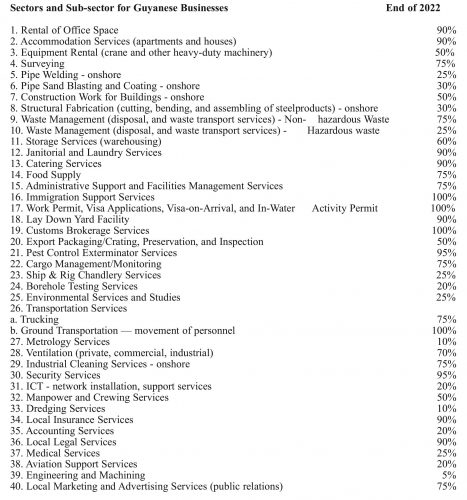
Vickram Bharrat
December 17 ,2021
-defines ‘Guyanese company’
Six years after the discovery of oil offshore and more than two years after production began, Guyana’s Local Content Bill was yesterday laid in the National Assembly, setting out the minimum percentage employment and goods and services procurement for locals, while requiring that the data to substantiate the claims be submitted every year.
“The Local Content Bill 2021 represents the principal vehicle through which Guyana seeks to negotiate a tradeoff between investors engaged in the petroleum sector and Guyanese nationals and Guyanese companies involved in the petroleum sector,” the Bill tabled in the name of Minister of Natural Resources Vickram Bharrat stated.
Local content has been a hotly debated topic in recent months.
“The Bill endeavours to do so by striving for economic diversification through prioritising Guyanese nationals and Guyanese companies in the procurement of goods and services for the enhancement of the petroleum sector value chain. This prioritisation will guarantee that there is an increased retention of the economic benefits in Guyana while simultaneously allowing for there to be an upsurge in the number, competencies, and capabilities of Guyanese nationals and Guyanese companies participating in the petroleum sector,” it adds.
To deliver on its legislative target, the proposed legislation, “puts in place regulatory mechanisms to implement, investigate, supervise, co-ordinate, monitor, and evaluate participation in local content in Guyana. Altogether, the Bill provides for the promotion of competitiveness, and the encouragement of the creation of related industries that will sustain the social and economic development of Guyana as well as other related matters.”
Making it explicit that when “Guyanese company” is referred to, the Bill states that it should be interpreted to mean “any company incorporated under the Companies Act – (a) which is beneficially owned by Guyanese nationals who ultimately exercise, individually or jointly, voting rights representing at least fifty-one per cent of the total issued shares of the company; and (b) that has Guyanese nationals holding at least seventy-five percent of executive and senior management positions and at least ninety percent of non-managerial and other positions.”
A “Guyanese national” means a citizen of Guyana.
Concerns have been raised about foreign companies coming here and registering, thereafter referring to the respective establishments as being 100% Guyanese.
A Local Content Secretariat will be established within the Ministry of Natural Resources and the Bill sets out a list of its functions, which includes developing and maintaining measures for the effective implementation of local content by contractors, sub-contractors and licensees.
The Secretariat will also ensure that there are developing and implementing strategies that will give preference to, or ensure equal treatment of Guyanese nationals and companies.
It is unclear what will be the role of the current Centre for Local Business Development as companies that are not registered with the Local Content secretariat will not be considered by oil companies or the government.
Before contractors, sub-contractors, or licensees set up here, they will have to submit to the Minister a Local Content Master Plan which must include an Employment Sub-Plan, Procurement Sub-Plan and Capacity Development Sub-Plan.
In addition, they will have to file a Procurement Sub-Plan that must include a supply chain management strategy, a forecast of required goods and services; identification of the goods and services to be procured from qualified Guyanese nationals and Guyanese companies; provision of Guyanese nationals or Guyanese companies with timely and appropriate access to information, business opportunities, joint ventures and partnership opportunities, technology and know-how, procurement systems and procedures suited to the scale and capacity of the local market, contract and payment terms that facilitate competitive financing and growth; and performance management systems and procedures, with feedback and support for improvement, the Bill states.
The Secretariat will develop and maintain a local content register of qualified Guyanese nationals and companies and recommend for approval or refusal, master and annual plans submitted.
A Director of the Secretariat will be appointed by the minister and other members can also be chosen by the minister if they meet the requisite experience, qualification and capacity to perform the duties set out.
Those duties will be to ensure that contractors meet the 45-day stipulation to submit to the secretariat their performance report of local content activities.
The Bill provides for the minimum local content levels as specified in the First Schedule and imposes the obligation on Contractors, Sub-Contractors or Licensees to comply with the minimum local content levels as specified. Critically, the section also allows for the Minister “to waive the requirement to comply with the minimum local content levels where (1) a petroleum operation is deemed to be of national interest; (2) a Contractor, Sub-Contractor or Licensee is unable to comply with the minimum local content levels in the performance of any petroleum operation due to the lack of current domestic capacity; or (3) compliance with a Master Services Agreements executed by a Contractor, Sub-Contractor or Licensee which is still in force immediately before the coming into operation of this Act prevents the Contractor, Sub-Contractor or Licensee from complying with the minimum local content levels set as prescribed.”
The Secretariat or a representative of the Secretariat is to have unrestricted access to the Contractor’s, Sub-Contractor’s or Licensee’s facilities to monitor, assess, evaluate, investigate, audit, and verify compliance with the Bill.
And if the Secretariat wants to initiate any investigation into any petroleum operation of a Contractor, Sub-Contactor or Licensee for the purpose of ensuring compliance with the law, if enacted, they are given that right.
The Bill also provides for secrecy and confidentiality obligations in relation to any information that is submitted pursuant the provisions of the Bill but are not required to be published. A person commits an offence if they fail to comply with the secrecy and confidentiality obligations.
Provision is made for a range of offences and the associated penalties. The offences range from submitting beyond the prescribed time, a local content plan, return, report, record, or any other document pursuant to the provision of this Bill, to failing to satisfy the prescribed local content requirements of an approved local content plan. The offences under this clause are punishable by a maximum fine ranging from one million dollars for an individual to ten million dollars for a body corporate.
“Clause 24 provides for the same penalty imposed on a body corporate for the commission of an offence to be imposed on a class of persons within a body corporate where the body corporate commits an offence and it is proved that the class of persons consented to, connived or neglected in their capacity,” the explanatory memorandum states.
Part V establishes and constitutes the Inter-Agency Committee for the purpose of supporting the Secretariat in the discharge of its functions in an advisory capacity. The committee shall consist of not less than seven members who are all appointed by the President. The members would be selected from the Office of the President and other ministries and government agencies along with the Private Sector Commission and Labour Union. They will serve for one year but their term may be renewed by the President.
The President will appoint a Chairperson and Vice Chairperson of the Committee from among the members appointed.
Below is an excerpt from the Bill that gives local content projections for sectors and sub-sectors that are to be realised by the end of next year.

